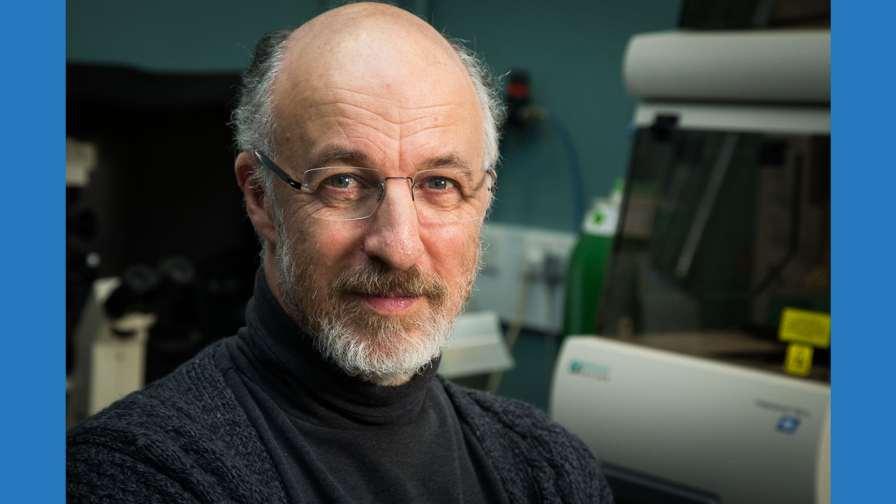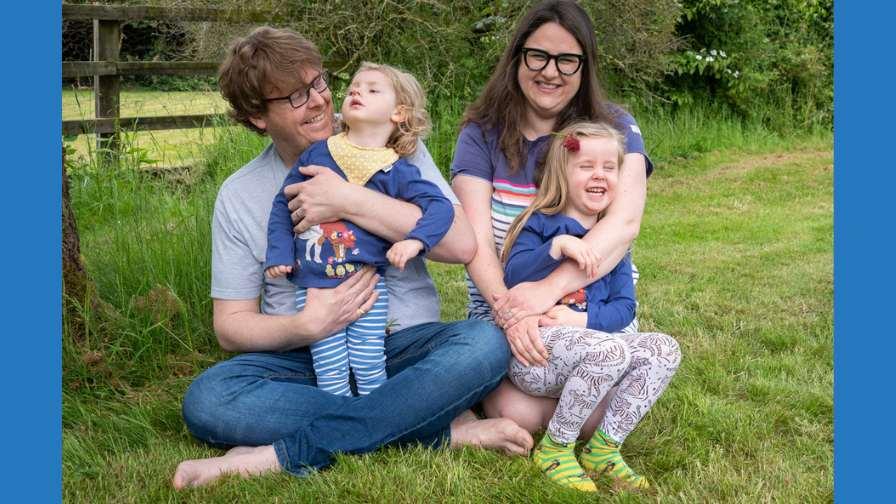Emmy was diagnosed with Vici syndrome at 18 months old.
Children’s charity Action Medical Research is funding new research into Vici syndrome, a very rare and devastating condition. The condition is caused by faults in the EPG5 gene which result in several symptoms including heart problems, delayed development, progressive deterioration of the nervous system, seizures and repeated infections due to problems with the immune system.[1] The global prevalence of Vici syndrome is less than 1/1,000,0002 and two-year-old Emmy is one of only 100 people worldwide with the condition.[2] There is no cure for Vici syndrome and most children do not live beyond their fifth birthday.
For the Romer-Lee family, the diagnosis came as a terrible shock. Ellie, Emmy’s mum, says, “We were completely blind-sided’ by such a devastating and life-limiting diagnosis. Vici syndrome is incredibly rare and affects so many parts of the body that Emmy has complex epilepsy and immune deficiency which results in recurrent respiratory and urinary tract infections and neuropathic pain.” There is no cure for Vici syndrome and treatment involves managing the symptoms. Ellie explains that one of the hardest symptoms to deal with is seeing Emmy in pain: “Emmy has neuropathic pain which means she used to scream and scream and at its worst, it has gone on for four or five days, day and night, but the medications have helped and the frequency and duration of these episodes has reduced. Emmy also has to take antibiotics every day to reduce the risk of infections.”
New research ultimately aims to help treat some of these symptoms. The project builds on the discovery by Professor Michael Duchen and Dr Kritarth Singh of University College London that cells from patients with Vici syndrome have problems with their mitochondria – the cell’s energy-generating powerhouses. They are now carrying out research in the laboratory to determine whether existing medicines could help to restore mitochondrial function in patient nerve cells. They will also investigate whether poorly functioning mitochondria contribute to the deterioration of the nervous system and seizures that affect children with Vici syndrome.
We hope this will one day lead to treatments that might benefit not only children with Vici syndrome but that might also benefit people with several other conditions in which similar processes are involved and for which no effective treatments are yet available.

For the Romer-Lee family, the life-changing diagnosis has meant that they have had to radically re-prioritise their lives as Emmy’s parents Ellie and Jon previously worked long hours in the tech sector: “We’ve totally re-designed our lives – partly because we’ve had to but also because there’s nothing more clarifying, in terms of what really matters, than having a little person like Emmy around,” says Ellie. “Emmy’s five-year-old sister, Tilly, has adapted and is amazing with Emmy and has a very close and loving relationship with her. Tilly does things for Emmy almost at a sub-conscious level, for example if she walks past and notices that Emmy’s pelvis is twisted, she’ll correct it. When she gets home from nursery, the first thing she’ll do is wash her hands and then immediately find Emmy to give her a huge cuddle. This is lovely to see.”
Ellie and Jon are supporting Action Medical Research’s campaign to raise funds for research into rare conditions including Vici syndrome: “The diagnosis has had a dramatic impact on our lives, but Emmy is amazing. She is calm and content, even serene, but with a brilliantly stubborn determination to try and move. She is very communicative once you learn her cues and responds enthusiastically to all kinds of therapies and inputs. Hippotherapy, with horses, is Emmy’s favourite part of the week and it’s just magical to see. This research, although not a cure, could help us manage some of Emmy’s symptoms including the seizures and pain.”

Sarah Moss, Director of Communications at Action Medical Research, comments: “We are committed to funding research into rare diseases, including ultra rare diseases like Vici syndrome. Our support of early-stage research is important as it is often the starting point for further work that leads to new treatments which can bring hope to families like Emmy’s."
With your help, we will never stop fighting for children with rare diseases. Find out how you can support our Vici syndrome fundraising appeal: www.action.org.uk/vici.
References
- Byrne et al. Orphanet Journal of Rare Diseases (2016) 11:21. DOI 10.1186/s13023-016-0399-x
- Alzaharani, A., Alghamdi, A. A., and Waggass, R. (2018). A Saudi infant with Vici syndrome: Case report and literature review. Open Access Maced. J. Med. Sci. 6 (6), 1081–1084. doi:10.3889/oamjms.2018.271.
